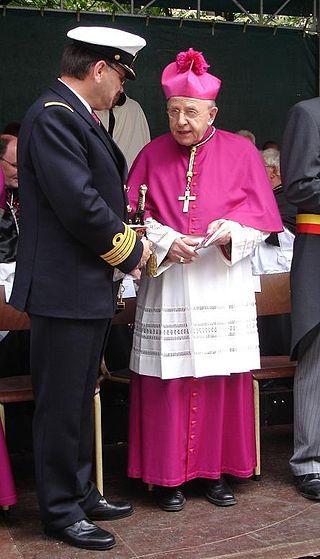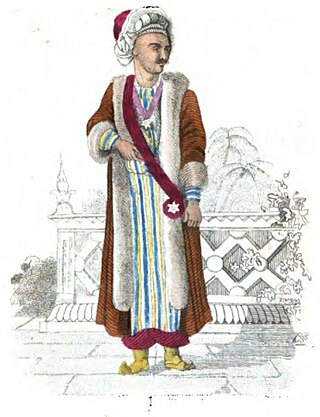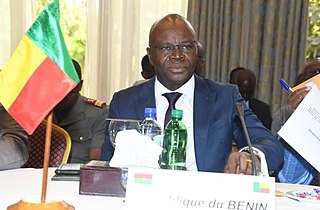
A diplomatic mission or foreign mission is a group of people from a state or organization present in another state to represent the sending state or organization officially in the receiving or host state. In practice, the phrase usually denotes an embassy or high commission, which is the main office of a country's diplomatic representatives to another country; it is usually, but not necessarily, based in the receiving state's capital city. Consulates, on the other hand, are smaller diplomatic missions that are normally located in major cities of the receiving state. As well as being a diplomatic mission to the country in which it is situated, an embassy may also be a nonresident permanent mission to one or more other countries.

An apostolic nuncio is an ecclesiastical diplomat, serving as an envoy or a permanent diplomatic representative of the Holy See to a state or to an international organization. A nuncio is appointed by and represents the Holy See, and is the head of the diplomatic mission, called an apostolic nunciature, which is the equivalent of an embassy. The Holy See is legally distinct from the Vatican City or the Catholic Church. In modern times, a nuncio is usually an archbishop.

An ambassador is an official envoy, especially a high-ranking diplomat who represents a state and is usually accredited to another sovereign state or to an international organization as the resident representative of their own government or sovereign or appointed for a special and often temporary diplomatic assignment. The word is also used informally for people who are known, without national appointment, to represent certain professions, activities, and fields of endeavor, such as sales.

The Heads of British diplomatic missions are persons appointed as senior diplomats to individual nations, or international organizations. They are usually appointed as ambassadors, except in member countries of the Commonwealth of Nations where a high commissioner is appointed. The head of mission to an international organization is usually a permanent representative. For some nations a consul or consul-general is appointed.

Ambassadors of the United States are persons nominated by the president to serve as the United States' diplomatic representatives to foreign nations, international organizations, and as ambassadors-at-large. Under Article II, Section 2 of the U.S. Constitution, their appointment must be confirmed by the United States Senate; while an ambassador may be appointed during a recess, they can serve only until the end of the next session of Congress, unless subsequently confirmed.

An apostolic nunciature is a top-level diplomatic mission of the Holy See that is equivalent to an embassy. However, it neither issues visas nor has consulates.
Non-voting members of the United States House of Representatives are representatives of their territory in the House of Representatives, who do not have a right to vote on legislation in the full House but nevertheless have floor privileges and are able to participate in certain other House functions. Non-voting members may introduce legislation. Non-voting members may vote in a House committee of which they are a member.

The United Nations Assistance Mission in Afghanistan is a UN Special Political Mission tasked with assisting the people of Afghanistan.

The Realm of New Zealand is the area over which the monarch of New Zealand is head of state. The realm is not a federation but is a collection of states and territories united under its monarch. New Zealand is an independent and sovereign state that has one territorial claim in Antarctica, one dependent territory (Tokelau), and two associated states. The Realm of New Zealand encompasses the three autonomous jurisdictions of New Zealand, the Cook Islands, and Niue.

A consul is an official representative of a government who resides in a foreign country to assist and protect citizens of the consul's country, and to promote and facilitate commercial and diplomatic relations between the two countries.
A special representative of the Secretary-General is a highly respected expert who has been appointed by the Secretary-General of the United Nations to represent them in meetings with heads of state on critical human rights issues. The representatives can carry out country visits to investigate alleged violations of human rights and act as negotiators on behalf of the United Nations.

The United Nations Assistance Mission for Iraq (UNAMI) was formed on 14 August 2003 by United Nations Security Council (UNSC) Resolution 1500 at the request of the Iraqi government to support national development efforts.
A United Nations Resident Coordinator is the highest United Nations official and the chief of UN diplomatic mission in a country.
Voting rights of United States citizens who live in Puerto Rico, like the voting rights of residents of other United States territories, differ from those of United States citizens in each of the fifty states and the District of Columbia. Residents of Puerto Rico and other U.S. territories do not have voting representation in the United States Congress, and are not entitled to electoral votes for president. The United States Constitution grants congressional voting representation to U.S. states, which Puerto Rico and other U.S. territories are not, specifying that members of Congress shall be elected by direct popular vote and that the president and the vice president shall be elected by electors chosen by the states.

In the Commonwealth of Nations, a high commissioner is the senior diplomat, generally ranking as an ambassador, in charge of the diplomatic mission of one Commonwealth government to another. Instead of an embassy, the diplomatic mission is generally called a high commission.

Aurélien Agbénonci is a Beninese diplomat who served in the government of Benin as Minister of Foreign Affairs from 2016 to 2023. Previously he was Deputy Special Representative of the Secretary-General for the United Nations Multidimensional Integrated Stabilization Mission in the Central African Republic (MINUSCA).










